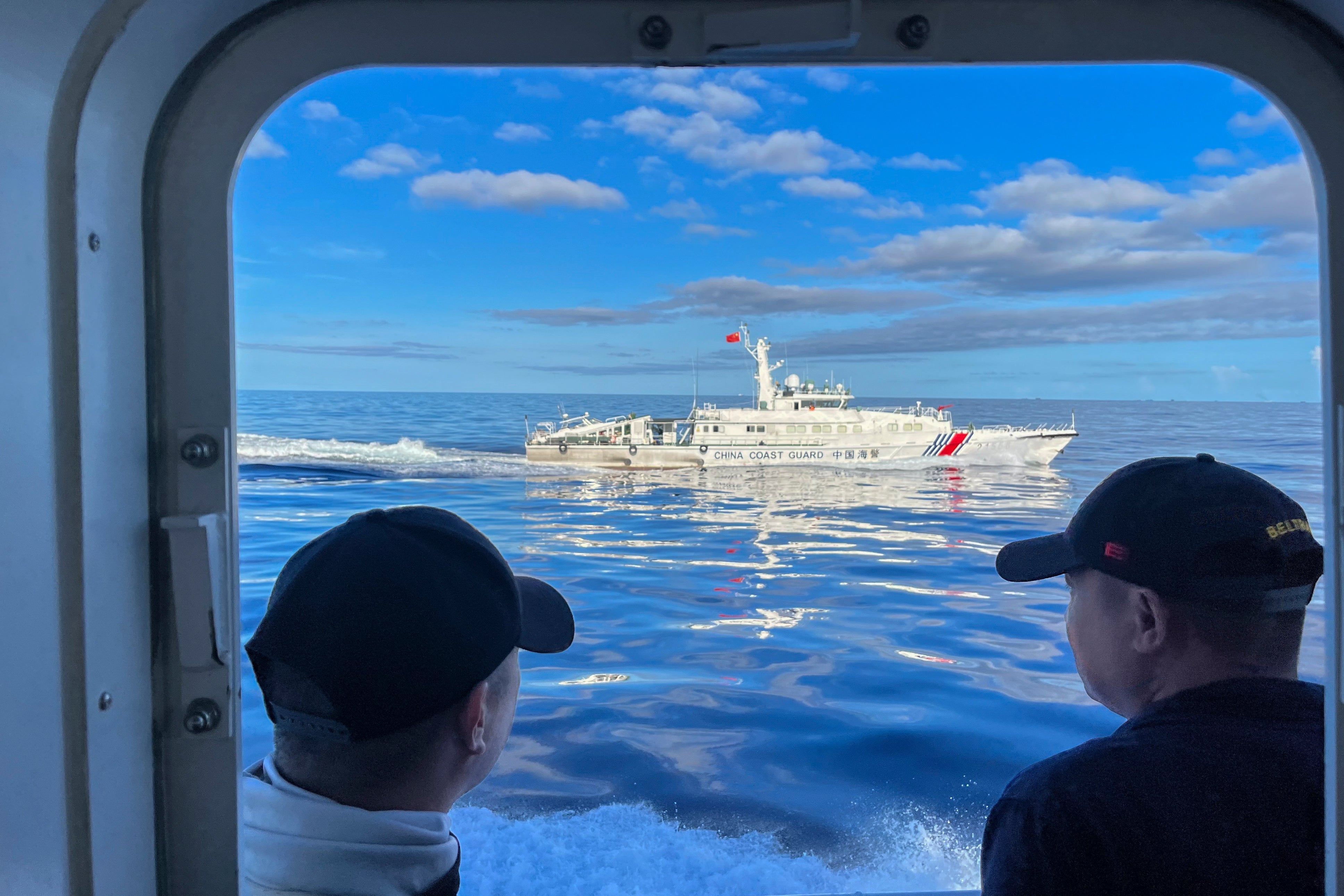Chinese coast guard blocks vessels off South China Sea shoal, causing a collision, Philippines says
The Philippines says Chinese coast guard ships blocked Philippine vessels from a disputed South China Sea shoal, causing a minor collision

Your support helps us to tell the story
From reproductive rights to climate change to Big Tech, The Independent is on the ground when the story is developing. Whether it's investigating the financials of Elon Musk's pro-Trump PAC or producing our latest documentary, 'The A Word', which shines a light on the American women fighting for reproductive rights, we know how important it is to parse out the facts from the messaging.
At such a critical moment in US history, we need reporters on the ground. Your donation allows us to keep sending journalists to speak to both sides of the story.
The Independent is trusted by Americans across the entire political spectrum. And unlike many other quality news outlets, we choose not to lock Americans out of our reporting and analysis with paywalls. We believe quality journalism should be available to everyone, paid for by those who can afford it.
Your support makes all the difference.Chinese coast guard ships blocked Philippine vessels off a disputed South China Sea shoal on Tuesday causing a minor collision, in a confrontation that unfolded as regional leaders gathered for a summit in Australia where alarm over Beijing’s aggression at sea was expected to be raised.
Philippine coast guard spokesperson Commodore Jay Tarriela said Chinese coast guard ships and accompanying vessels blocked and executed dangerous maneuvers against two Philippine coast guard ships that resulted in a minor collision in the disputed waters.
The collision between a Chinese coast guard ship and one of two Philippine coast guard vessels caused minor structural damage to the BRP Sindangan, Tarriela said without providing other details.
Tarriela did not say where the latest confrontation took place, according to his post on X, formerly known as Twitter, but the military earlier reported that its navy forces were delivering supplies and fresh troops to the Philippine-occupied Second Thomas Shoal, the site of several tense skirmishes between Chinese and Philippine coast guard ships and accompanying vessels last year.
The Philippine coast guard ships were escorting navy forces who were aboard two civilian supply boats, according to the Philippine military.
“Throughout the operation, the Philippine coast guard vessels faced dangerous maneuvers and blocking from Chinese coast guard vessels and Chinese maritime militia,” Tarriela said. “Their reckless and illegal actions led to a collision."
Chinese Embassy officials in Manila did not immediately comment on the latest confrontation.
The long-simmering territorial disputes in the South China Sea are expected to be high on the agenda of a summit of leaders of the Association of Southeast Asian Nations and their Australian counterpart in Melbourne.
Ahead of Wednesday’s summit in Melbourne, Philippine President Ferdinand Marcos Jr. said in a forum in the Australian city that his administration “will do whatever it takes” to manage any threat to his country’s territory but stressed that Manila would continue “to tread the path of dialogue and diplomacy” in resolving disputes with China.
Philippine security officials have accused the Chinese coast guard and suspected militia ships of blocking Philippine vessels and using water cannons and a military-grade laser that temporarily blinded some Filipino crewmen in a series of high-seas hostilities last year.
Speaking at a forum organized by the Lowy Institute in Melbourne on Monday, Marcos renewed his administration's resolve to “never surrender even a square inch of our territory and our maritime jurisdiction” in the disputed waters.
"It is unfortunate that despite the clarity provided by international law, provocative, unilateral and illegal actions continue to infringe upon our sovereignty, our sovereign rights, our jurisdictions,” Marcos said, referring to Chinese actions at sea.
In a statement issued by the Chinese Embassy in Manila on Monday, China accused the Philippines of frequently making “provocative moves in the South China Sea, infringing on China’s territorial sovereignty and maritime rights and interests.”
“China has taken necessary measures in accordance with law to defend its own sovereignty, rights and interests,” the Chinese statement said, denying accusations that China was harassing the Philippines.
The confrontations have sparked fears of a larger conflict in the disputed waters that could involve the United States.
Chinese and Philippine officials met in the Chinese city of Shanghai in January and agreed to take steps to lower tensions in the disputed waters. But the latest territorial faceoff underscores the difficulty of any such attempt to de-escalate decades of on and off hostilities.
China has repeatedly justified the actions of its coast guard, which it said would always resolutely defend its sovereignty in the South China Sea from illegal incursions, including by Philippine ships.
The United States has warned that it’s obligated to defend the Philippines, its oldest treaty ally in Asia if Filipino forces, ships and aircraft come under an armed attack, including in the South China Sea. China has warned the U.S. to stop meddling in what it calls a purely Asian dispute.
Aside from China and the Philippines, Brunei, Malaysia Vietnam and Taiwan have been locked for decades in the increasingly tense territorial disputes in the South China Sea, a major global trade route which is also believed to be sitting atop rich undersea deposits of oil and gas.